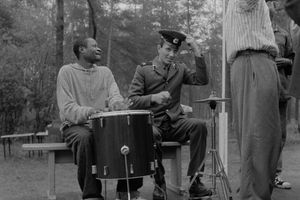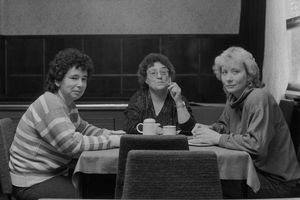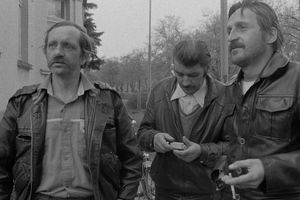Neues in Wittstock
Regie: Volker Koepp, 99 Min., Schwarz-Weiß, Dokumentarfilm
Deutschland
DEFA-Studio für Dokumentarfilme GmbH, 1992
- Film-/Videoformat
- 35 mm
- Länge in m
- 2726
- Sonstiger Titel
- Wittstock (neu)
- Englischer Titel
- News From Wittstock
- Premierendatum
- Anlaufdatum
- Erstsendedatum
Kurzinhalt (Deutsch)
Seit 1974 drehte das Filmteam in der Kleinstadt Wittstock vier Dokumentarfilme. Im Mittelpunkt standen Arbeiterinnen aus einem in Wittstock neu erbauten Textilwerk, in dem 1984 beinahe 3000 Frauen arbeiteten.
Dieser Wittstock-Film beginnt nach der Wende. Koepp zeichnet die Konsequenzen der Wiedervereinigung auf und beschreibt die wirtschaftlichen und sozialen Umwälzungen in Ostdeutschland. Im Verlauf dieses Films werden die Veränderungen der Stadt und der Umgebung dokumentiert, der filmzeitliche Ablauf aber wird von drei Frauen bestimmt, die das Team 1974 kennenlernte und schließlich über 18 Jahre begleitete.

(R: Volker Koepp, 1992) Fotograf: Christian Lehmann

(R: Volker Koepp, 1992) Fotograf: Christian Lehmann
Filmstab
- Regie
-
- Volker Koepp
- Drehbuch
-
- Volker Koepp
- Kamera
-
- Christian Lehmann
- Schnitt
-
- Angelika Arnold
- Kameraassistenz
-
- Michael Loewenberg
- Ton
-
- Henner Golz (Tonmischung)
- Ronald Gohlke
- Produktionsleitung
-
- Fritz Hartthaler
- Sprecher
-
- Volker Koepp
Auszeichnungen
- 35. Internationales Leipziger Festival für Dokumentar- und Animationsfilm (1992): Preis der internationalen Jury FIPRESCI
- 35. Internationales Leipziger Festival für Dokumentar- und Animationsfilm (1992): Goldene Taube
Kurzinhalt (Englisch)
The film team has shot four documentaries in the small city of
Wittstock since 1974. In the spotlight of these films were the female workers from the newlybuilt textile company in Wittstock, in which nearly 3.000 women worked in 1984.
In the same year a full-Iength documentary, "Leben in Wittstock" (Life in Wittstock) was filmed as a summary. (These films ran at the "Forum der Junge Film" (Forum for new films) and were broadcast several times by the ARD - Allgemeine Rundfunkanstalten Deutschlands).
After the fall of the Berlin wall, filming began on a new documentary in the city of the Brandenburg March north of Berlin. In the course of the film, the changes in the city and the surrounding area are documented. The chronological course of the film is determined by three women whom the film team met in 1974 and finally accompanied over 18 years.



